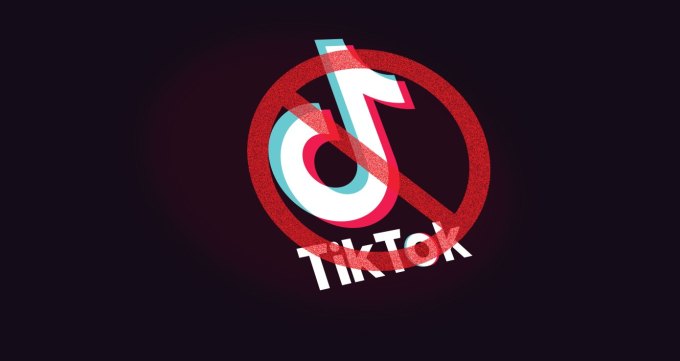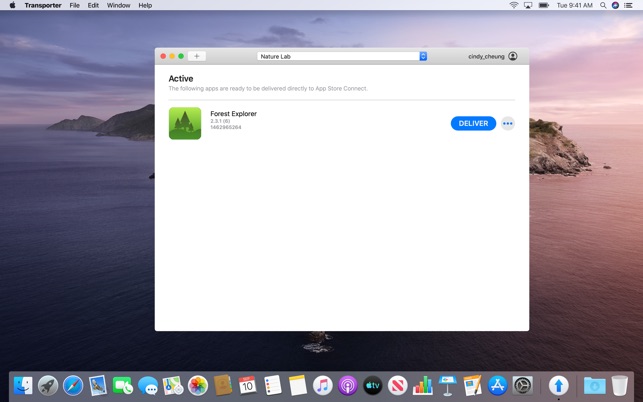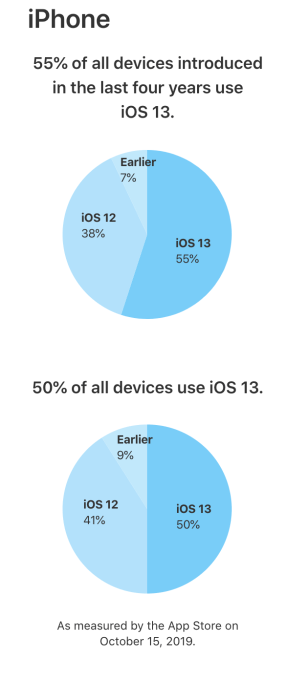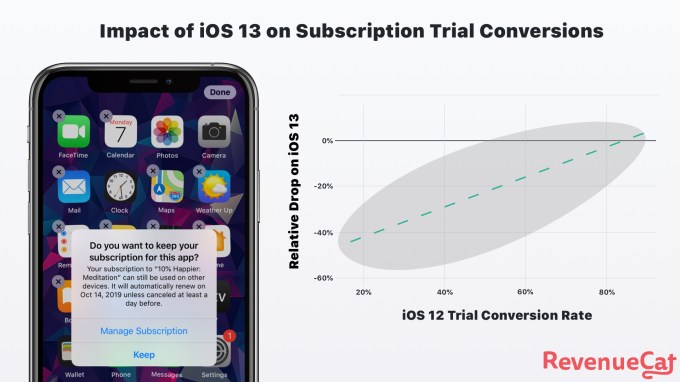Welcome back to This Week in Apps, the Extra Crunch series that recaps the latest OS news, the applications they support, and the money that flows through it all.
The app industry in 2018 saw 194 billion downloads and more than $100 billion in purchases. Just in the past quarter, consumer spending exceeded $23 billion and installs topped 31 billion. It’s a fact: we spend more time on our phones than we do watching TV.
This week, Chinese censorship is still a big topic, and one which sees Apple CEO sitting down with Chinese regulators to discuss. China was also found to have forced a spy app on its people, according to a code review. Meanwhile, TikTok got cloned in Russia. It also decided to bring in corporate lawyers to help it to figure out how to moderate its content and be transparent.
We also take a look at headlines about Luna Display’s response to sherlocking, an Arcade developer’s localization efforts, and hear from a former App Store reviewer, among other things.
Let’s get to it.
Headlines
League of Legends to make the leap to mobile
League of Legends is coming to mobile. The game’s maker, Riot Games announced this week it would publish a new version of League of Legends called Wild Rift that will be available on mobile devices and consoles. Other popular PC games — like PUBG Mobile, Call of Duty, and Fortnite — have found massive success by bringing their games to mobile, so it’s not surprising that League would do the same. The mobile version is set to launch in 2020, but pre-registration is already available on Google Play.
Mobile gaming today accounts for 10% of the time users spend in apps — a percentage that has remained steady over the years, even though our time in apps overall has grown by 50% over the past two years. And games are continuing to grow their share of consumer spend, said App Annie in a June research report, which also called out cross-platform gaming as a huge trend along with hyper-casual. This has attributed to mobile games reaching a 60% market share in consumer spend in 2019, the firm said.
Google boots “predatory” loan apps from Play Store
Google cracked down this week on harmful financial apps that prey on users by offering high-interest loan services as well as personal loan apps. The company updated its Play Store Policy documentation to restrict any loan apps and services with a 36% APR or higher. Apps for personal loans in the United States must display their maximum APR, calculated consistently with the Truth in Lending Act (TILA), says Google.
China’s spying through apps
The Chinese Communist Party this year published an app called ‘Study the Great Nation,’ which appears at first glance to be another propaganda tool. But when the Open Technology Fund asked German security research firm Cure53 to audit the product, which was developed by Alibaba, they found something unusual. The code was equipped with anti-reversing techniques, which implied there were more malicious instructions hidden away from view. But some of the code they did find gave the app superuser privileges — and potentially a backdoor to spy on its users. The app also included file transmission capabilities. The app was only focused on Chinese spying on its own citizens, however — it’s not published in the Play Store, and is only available in China.
TikTok is now the app to copy
In the U.S., a TikTok competitor (or a Vine reboot) Byte is in beta testing. But it’s not the only TikTok alternative to come along. This week, Russian tech giant Yandex launched its TikTok rival called Sloy — which means “layer” in Russian.

The app lets users create 90-second videos using augmented reality effects and background music, similar to TikTok. It also has a special feature where its A.I. can recognize and tag the clothing you’re wearing — something that could make it an Instagram rival further down the road, as well.
TikTok taps corporate law firm K&L Gates to advise on its U.S. content moderation policies.
Speaking of China and TikTok, the short-form video app is still dealing with the fallout from its censorship issues. The company claims it’s just trying to make TikTok a place for “fun” and “creative” content, but in reality, it’s censoring the Hong Kong protests and other things China doesn’t want its citizens to know about, but leaves U.S. political content untouched. The company now plans to form a committee of experts who will help it craft content moderation policies and increase transparency around how it’s moderating (or censoring) users’ speech on its platform, as well as issues like child safety, hate speech, misinformation, bullying and more.

To aid in this, the company is working with a group from corporate law firm K&L Gates, including former Congressmen Bart Gordon and former U.S. House Rep., now government affairs counselor, Jeff Denham, who bring to the initiative their expertise in the technology sector.
More details about TikTok’s plans for this committee here on TechCrunch.
Tim Cook talks app bans with China
Apple CEO Tim Cook met the chief of China’s market regulator in Beijing on Thursday, according to Reuters. The exec discussed several things, including Apple expanding investment in China, consumer rights protection and fulfilling corporate social responsibility. The latter item is an indication that the ban/un-ban/re-ban of the Hong Kong map app used by protestors was discussed in the meeting.
Meanwhile, a group of US lawmakers is urging Apple to reinstate the banned app.
Apple launches a new version of its Transporter app on Mac App Store
Transporter offers a more streamlined way to upload binaries to App Store Connect, Apple said in its announcement. Developers can just drag and drop their .ipa and .pkg files to Transporter, then view their delivery progress — including validation warnings, errors, and delivery logs, so you can quickly fix any issues. They can also see their past deliveries by date and time.

Just don’t try to upload to App Store Connect on Sunday — it will be down. Apple said it’s conducting scheduled maintenance Oct. 20, 2019 from 6:00 AM PT for up to 8 hours. App Store Connect on the web, the App Store Connect app, the App Store Connect API, and the Developer ID notary service will be unavailable during this time.
iOS 13 tops 50% adoption
The adoption rate for iOS 13 is continuing to outpace iOS 12. According to Apple’s website (spotted by 9to5Mac), 55% of iPhones introduced in the last four years are now running iOS 13, while 38% are running iOS 12. In terms of all iOS devices, 50% are running iOS 13, while 41% are running iOS 12.

Compared with iOS 12, the adoption of iOS 13 among the entire user base is identical at 50%, 9to5Mac found. But in terms of devices introduced in the last four years, iOS 13 is a bit ahead at 55% compared to 53% last year.
Apple’s new subscription management prompt in iOS 13 is working
According to early data on iOS 13, subscription management startup RevenueCat says it has found a big change in subscription conversion rates on the new OS compared with iOS 12. On iOS, users who delete an app with an active subscription are asked if they want to keep the subscription active. 80% of the apps the company examined showed a statistically significant decrease in trial conversion rate for users on iOS 13 versus iOS 12.
Across the apps we sampled, we measured an average drop of 9% in absolute conversion rate, which translates into a median relative drop in conversion rate of 29%, but with a pretty wide range depending on the app, anywhere from 0% to 60%. Apps that already have a high trial conversion rate should be relatively unaffected by this change. However, apps that rely on customers forgetting to cancel a subscription will see the biggest change.

The bigger drops don’t necessarily mean the app caught users with a scam — they might just not be targeting the right crowd with their marketing and ad spend.
What is clear is that the user-friendly feature will help keep the subscription economy from being overrun with bad actors, by turning app deletions into a prompt to end ongoing payments, too.
Parents are frustrated with Apple because kids keep finding workarounds for Screen Time limits
The Washington Post reported on the growing frustrations parents have with Apple’s Screen Time, which kids and teens have managed to outsmart, thanks to the internet. So far, kids have discovered that changing the time zone in Settings gets them out of Downtime. They also found they can use iMessage to watch YouTube videos, can factory reset their device to avoid the limits, and they can get Siri to send their texts when parents have shut off iMessage. Some even got their parents’ passcodes in order to get out of their limits.
Parents are now getting frustrated with Apple’s lack of response on these issues. The end result is that some parents are having to resort to old-school methods — like asking the kid to hand over their phone entirely for a little downtime.
More Reading
Long Read: What to do when you get Sherlocked by Apple
It’s become so routine for Apple to screw over third-party app developers by taking their ideas and turning them into OS features, there’s even a term for it: getting “sherlocked.” Most recently, this happened to Astropad, the makers of Luna Display, a tiny dongle that allowed its users to turn an iPad into a second screen for their Mac. At WWDC 2019, Apple announced Sidecar, an OS feature that would just that…natively.

Astropad has now written a deep dive about how it’s trying to recover and what other developers should do if they ever have something similar happen to them. As for Luna Display, it’s already been updated to support more than just iPads — you can now use it with older Macs, too.
How to: How Apple Arcade mystery Tangle Tower was translated into more than a dozen languages
The Verge takes a look at the localization efforts of one Apple Arcade developer, who per Apple’s requirements for Arcade, had to localize its text-heavy game in more than 14 languages.
Tangle Tower. The game, developed by a four-person team led by brothers Tom and Adam Vian, has more than 40,000 words of in-game text, from character descriptions to the copious dialogue. The brothers had originally planned to localize the game into only a handful of languages — including English, French, Italian, German, Spanish, and Japanese — but, due to Apple’s requirements, Tangle Tower ended up launching in 17 languages. The pair says it was worth the effort. “
The report details what that process was like for the small team, from start to finish. It’s worth also noting how Apple’s Arcade business model helps with these upfront costs, which is helping to bring games to wider audiences.
Retrospective: How the App Store Ended a Golden Era of Software
An app reviewer from the early 2000’s recounts her front-row seat from the App Store’s evolution from the “delightful to predatory.” A self-confessed app hoarder and heavy app user, Megan Morrone says she didn’t realize what the transition from downloads to app stores was really like for developers, how the app stores lack of a demo mode hurt developers’ businesses, among other things. She also seems to regret recommending “garbage” apps, adding that most of what she told friends to download now no longer exists.
The post is written in a sort of free-flow style, and fails to make any singular point. But it’s nonetheless an interesting read of someone who worked the front lines of App Store review, and how their views on apps have changed over the years.
Downloads
App of the Week: Do Not Pay
The app that helps you contest your parking tickets added a new feature called “Skip Waiting on Hold,” as part of its $3 per month suite of services.

Like it sounds, the app navigates a phone system’s menu for you, using tricks to get a human on the line. When it does, it rings your phone so you can talk to an actual person. “These big companies [and governments] are getting away with a lot,” 22-year-old founder Joshua Browder told Techcrunch.
Game of the Week: Rayman Mini
Apple Arcade keeps rolling out the hits.
The newly released Ubisoft title is already getting good reviews, which call it delightful and a joy to play. But it also thrives under the Arcade model, which keeps it free from in-app purchases.
Tweet of the Week:
Matt takes Apple to task for its incomplete and missing documentation…by documenting it himself.